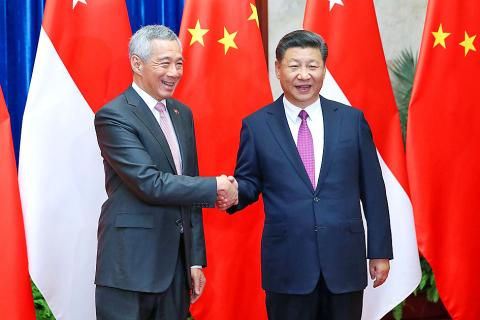The Presidential Office yesterday declined to comment on media reports that Singapore would stop sending troops to Taiwan to participate in a long-running joint military exercise, saying only that the government greatly values its friendship with Singapore.
“The government greatly values its long and strong friendship with Singapore. The Presidential Office has no comment on baseless news reports,” Presidential Office spokesman Alex Huang (黃重諺) said in response to media requests for comment on Singapore’s rumored plan to end military exchanges with Taiwan.
Ministry of National Defense spokesman Major General Chen Chung-chi (陳中吉) also declined to comment on the news, calling it speculation.

Photo: AFP
In 1974, then-president Chiang Kai-shek (蔣介石) agreed to then-Singaporean prime minister Lee Kuan Yew’s (李光耀) request for the Singaporean military to be trained by the Republic of China’s armed forces in Taiwan due to the city-state’s limited space.
Chiang’s son, then-premier Chiang Ching-kuo (蔣經國), in 1975 signed an agreement with Lee and initiated the partnership, codenamed “Project Starlight” (星光計畫), in which Singapore sent troops to Taiwan to receive military training.
The project has continued to this day and has taken on the form of a joint military exercise after Taiwan helped the Singaporean military develop its defense capabilities.
Former deputy minister of national defense Lin Chong-pin (林中斌) yesterday said word of the rumored plan was passed on to him by a reporter in Hong Kong.
If true, the significance behind Singapore’s decision to end its military exchanges with Taiwan following a meeting between Chinese President Xi Jinping (習近平) and Singaporean Prime Minister Lee Hsien Loong (李顯龍) would be “self-explanatory,” Lin added.
Democratic Progressive Party Legislator Tsai Shih-ying (蔡適應) yesterday said there have been several signs that Singapore would back out of Project Starlight.
The most obvious reason is that China has been pressuring Singapore to end its military exchanges with Taiwan to limit the nation’s international space, he said.
That Singaporean troops receiving training in Taiwan was a topic of discussion between Xi and Lee Hsien Loong was likely a hint that the speculation is true, Tsai said, adding that joint military drills by Taiwan and Singapore have been protested by Taiwanese.
The Singaporean government has invested A$2.2 billion (US$1.75 billion) to build a military base in Queensland after it signed the Comprehensive Strategic Partnership agreement with Australia and has set plans in motion to move its troops from Taiwan to Australia, where there would be more space to conduct military drills, he said.
Tsai said while he hopes that Singapore would maintain a level of military exchanges with Taiwan, he could understand why the Singaporean government might feel that it is “inconvenient” to continue training its armed forces in Taiwan, given the circumstances.

CHAOS: Iranians took to the streets playing celebratory music after reports of Khamenei’s death on Saturday, while mourners also gathered in Tehran yesterday Iranian Supreme Leader Ayatollah Ali Khamenei was killed in a major attack on Iran launched by Israel and the US, throwing the future of the Islamic republic into doubt and raising the risk of regional instability. Iranian state television and the state-run IRNA news agency announced the 86-year-old’s death early yesterday. US President Donald Trump said it gave Iranians their “greatest chance” to “take back” their country. The announcements came after a joint US and Israeli aerial bombardment that targeted Iranian military and governmental sites. Trump said the “heavy and pinpoint bombing” would continue through the week or as long

TRUST: The KMT said it respected the US’ timing and considerations, and hoped it would continue to honor its commitments to helping Taiwan bolster its defenses and deterrence US President Donald Trump is delaying a multibillion-dollar arms sale to Taiwan to ensure his visit to Beijing is successful, a New York Times report said. The weapons sales package has stalled in the US Department of State, the report said, citing US officials it did not identify. The White House has told agencies not to push forward ahead of Trump’s meeting with Chinese President Xi Jinping (習近平), it said. The two last month held a phone call to discuss trade and geopolitical flashpoints ahead of the summit. Xi raised the Taiwan issue and urged the US to handle arms sales to

BIG SPENDERS: Foreign investors bought the most Taiwan equities since 2005, signaling confidence that an AI boom would continue to benefit chipmakers Taiwan Semiconductor Manufacturing Co’s (TSMC, 台積電) market capitalization swelled to US$2 trillion for the first time following a 4.25 percent rally in its American depositary receipts (ADR) overnight, putting the world’s biggest contract chipmaker sixth on the list of the world’s biggest companies by market capitalization, just behind Amazon.com Inc. The site CompaniesMarketcap.com ranked TSMC ahead of Saudi Aramco and Meta Platforms Inc. The Taiwanese company’s ADRs on Tuesday surged to US$385.75 on the New York Stock Exchange, as strong demand for artificial intelligence (AI) applications led to chip supply constraints and boost revenue growth to record-breaking levels. Each TSMC ADR represents

State-run CPC Corp, Taiwan (CPC, 台灣中油) yesterday said that it had confirmed on Saturday night with its liquefied natural gas (LNG) and crude oil suppliers that shipments are proceeding as scheduled and that domestic supplies remain unaffected. The CPC yesterday announced the gasoline and diesel prices will rise by NT$0.2 and NT$0.4 per liter, respectively, starting Monday, citing Middle East tensions and blizzards in the eastern United States. CPC also iterated it has been reducing the proportion of crude oil imports from the Middle East and diversifying its supply sources in the past few years in response to geopolitical risks, expanding